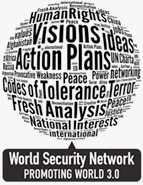Former U.S. National Security Advisor Robert McFarlane: "The missing element was trying to engage the clergy"

WSN: How did you start to work with this group?
Robert McFarlane: Since the war has been going on in Iraq for a couple of years, it seemed to me that the missing element was trying to engage the clergy in a constructive way to nurture reconciliation. After all, the significant source of violence was ostensibly sectarian-based reprisals of killings. I began to ask, is anyone trying to bring the clergy together? Accidentally ,through a friend in Washington, I learned that Andrew White was doing this very thing, and I asked, how can I help? A year ago, I went to Baghdad and met Andrew and his colleagues, and it seemed to me to be a very promising setting. Although the original meetings were fairly large, gradually we moved on to a smaller group of senior leaders and we try to hold them accountable as senior powerful people. If you really are powerful, why don't you use your power in a constructive way that might work? And I have been encouraged to believe in this project ever since that meeting. I think in this session we may get some concrete results where they identify themselves as believing that reconciliation is right and there is no Koranic justification for the violence, and therefore, they should label it as sinful and criminal, and stand behind that. Preach it in the mosque for the next few months and we may see some good.
WSN: Have you observed an actual change on the ground because of their work?
Robert McFarlane: I'd like to be able to take credit for all of this, but I am not sure that I can draw a correlation between our meetings and the decline in violence. There has been a decline in violence, but I cannot say that it derives from these meetings. There have been meetings between our meetings, which are only three or four times a year, but I have been hoping that they can work on common projects: Sunni and Shia working on building a school, inoculating children, creating a football field - whatever there might be that gets them to work together. I don't think that it has happened yet, but that is next on our agenda: concrete projects.
WSN: Taking into consideration your expertise on the Middle East and Lebanon in particular, since you were here at a crucial time in the 1980s, how do you see the situation now?
Robert McFarlane: It is something of a source of sadness for me. Fifty years ago this summer, I came to Lebanon aboard ship, just off this coast when President Eisenhower deployed the marines here as the Soviet Union tried to get a foothold in Syria. Twenty years ago I came as President Reagan's representative to negotiate the withdrawal of Syrian forces and Israeli forces. We made some progress back then. I was encouraged when Rafiq Hariri, the prime minister at the time and a very strong Lebanese nationalist, had taken away much of the damage, both politically and physically by rebuilding the city. Unfortunately, there has been a relapse, with the rise of Hizballah supported by Iran and with the help of Syria. The political situation is less stable and more precarious because of the armed competition between Sunni and Shia, Christians and Druze. They have a long way to go before making a new agreement between these factions, and it is going to take a lot of leadership.
WSN: Do you see anyone being able to bring all these forces together?
Robert McFarlane: I don't see any strong leaders on the horizon right now, and unfortunately what passes for leadership is support for an armed Hizballah, people who are only interested in themselves and who are not Lebanese patriots; they are foreign-sponsored and pretenders. It's sad.
WSN: How do you see relations between Syria and Iran? Any chance to take Syria away from the symbiosis it has with Iran?
Robert McFarlane: There is a glimmer of hope there. And I hope the US is enlightened enough to see this possibility and put some real effort into negotiations with Syria. Undoubtedly, it would involve some sort of economic and political benefits for Syria, which would be fine if we can swing them away from this tutorial with Iran. One can even imagine, in a romantic moment, that you might have Israel involved to find a modus vivendi involving the return of territory to Syria, and put a peacekeeping presence there. I am hopeful - not yet ready to say optimistic - but I am hopeful. It depends heavily on the United States and if it will be willing to put the political capital into taking risks out here and not leave until the job is done.
WSN: Speaking of US policy, what is your opinion about US policy with regard to the Middle East region? Are we going to see a change?
Robert McFarlane: I think you will see a change regardless of who wins the elections. Both sides have become very conscious of how important, vital and volatile this region is and that our interests, that transcend energy, are very much caught up in trying to relieve the tensions between Palestinians and Israelis as well as to relieve the impeding arms race between Iran and the Gulf states, to nurture real stability in Iraq - there is no end to the problems. Also, because of the consequences, these issues deserve full time attention at the most senior professional diplomatic level, and I think that either party will do this. I know John McCain is very aware of this issue.
WSN: Does the United States need a partner in the region, and would the EU be a suitable one to work with on all of these issues?
Robert McFarlane: We truly need a partner and I hope it will be the EU. To have a full partnership. Sharing the burden, sharing the blame, and sharing the cost.
WSN: Thank you sir.








Comments